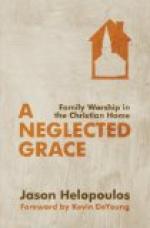“One sleeps where southern vines
are dress’d,
Above the noble slain;
He wrapped his colors round his breast,
On a blood-red field of Spain.
“And one—o’er her
the myrtle showers,
Its leaves by soft winds fanned;
She faded midst Italian flowers—
The last of that fair band.
“And parted thus, they rest, who
played
Beneath the same green tree;
Whose voices mingled as they prayed
Around one parent knee!”
It is thus in almost every household. The members may be divided into two classes,—the present and the absent ones. Who may not say of his family—
“We
are not all here!
Some are away—the dead ones
dear,
Who thronged with us this ancient hearth,
And gave the hour of guiltless mirth.
Fate, with a stern, relentless hand,
Looked in and thinned our little band.
Some like a night-flash passed away,
And some sank lingering day by day,
The quiet graveyard—some lie
there,—
We’re
not all here!”
The bereavements of home are diversified. The reverses of fortune constitute an important class of family afflictions, causing the habits, customs, social privileges and advantages of home to be broken up and changed. Many a family, which, in former days, enjoyed all the pleasures and privileges of wealth and social distinction, have now to struggle with cruel poverty, and receive from the world, scorn and ridicule and dishonor.
But the greatest bereavement of home is, generally, death. They only, who have lived in the house of mourning, know what the sad bereavements are which death produces, and what deep and dark vacancies this last enemy leaves in the stricken heart of home.
“The lips that used to bless you
there,
Are silent with the dead.”
To-day we may visit the family. What a lovely scene it presents! The members are happy in each other’s love, and each one resting his hopes upon all the rest. No cares perplex them; no sorrows corrode them; no trials distress them; no darkness overshadows them! What tender bonds unite them; what hopes cluster around each heart; what a depth of reciprocated affection we find in each bosom; and by what tender sympathy they are drawn to each other!
But alas! in an hour of supposed security, that loving group is broken up by the intrusion of death, and some one or more carried from the bosom of love to the cold and cheerless grave. The curfew-bell speaks the solemn truth, and warns the members that “in the midst of life they are in death.” Where is the home that has not some memorial of departed ones,—a chair empty, a vacant seat at the table,—garments laid by,—ashes of the dead treasured up in the urn of memory! What sudden ravages does this ruthless foe of life, often make in the family! The members are often taken away, one by one in quick succession, until all of them are laid, side by side beneath the green sod.




